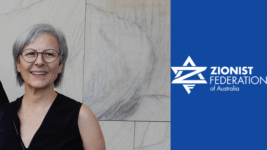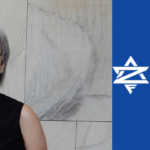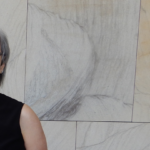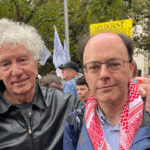Federal Court Greenlights Baseless Zionist Case Against Journalist Mary Kostakidis

Federal Court Justice Stephen McDonald has permitted the Zionist Federation of Australia to go ahead with its lawsuit against renowned Australian journalist Mary Kostikidas, which was lodged in April this year, after her defence team sought to have the case struck out in a July 2025 hearing, due to the baseless claim that Kostakidis had been antisemitic in posting on social media platform X.
The claim levelled against Kostakidis, who has been a key commentator regarding the unreported truths surrounding the Gaza genocide, was initially lodged with the Australian Human Rights Commission in July 2024, with the subsequent conciliation process having broken down. So, Zionist Federation chief executive Alon Cassuto then took the next step of taking the matter to the courts.
Cassuto charged Kostakidis with disseminating antisemitic posts on X, with the focus being on one that involved the reposting of a clip featuring the late Hezbollah leader Hassan Nasrallah condemning Israel. Kostakidis in addition to the original post wrote that Israel, which was then perpetrating genocide in Gaza, as well as low-level attacks upon Lebanon, was getting some of its “own medicine”.
At the time the charge was laid against Kostakidis, the Australian constiuency was new to the moral panic around antisemitism and the ensuing McCarthyite pursuit of its transgressors, which involves calling out cultural figures decrying Israel’s perpetration of genocide and seeking to silence and punish them as antisemites, via drawn out and expensive court action: a process known as lawfare.
Other notable targets have been journalist Antoinette Latouff, writer Randa Abdel-Fatah and linguist Dr Nick Riemer.
Justice McDonald further found last week that the case against Kostakidis couldn’t simply be dropped over the defence assertion that a journalist reporting news can’t be taken to have acted out of racial or religious prejudice as a true statement of fact, as his Honour found that journalists may act out of such prejudice, and therefore, the charge needs to be determined judicially at trial.
Lawfare case to proceed
The Zionist Federation lodged its action with the court on 31 March 2025. The complaint is the same as Cassuto lodged with the AHRC on 14 July last year. The issue Kostakidis appears to have posed to the Zionist Federation, which has sought to silence her, is that the well-known journalist was providing a commentary on Gaza that didn’t toe the skewed mainstream media version of events.
Cassuto’s race vilification claim alleges that Kostakidis breached section 18C of the Racial Discrimination Act 1975 (Cth), when she posted footage of the late Lebanese Hezbollah leader Hassan Nasrallah warning Israelis they were not safe in the region, as Lebanon was then engaged in low-level fighting with Israel, of which Tel Aviv was about to dramatically escalate into full-blown war.
Section 18C of the Racial Discrimination Act contains a law that makes it illegal to publicly act in a way that’s “reasonably likely” to offend, insult, humiliate or intimidate a person or a group based on their “race, colour or national or ethnic origin”. In this case, it is being extended to capture a religious group. This law is controversial as the Coalition has sought to weaken it, due to its broad reach.
Justice MacDonald ruled on Thursday 9 October that the case should not be struck out but rather some of the assertions the Zionists made about the impact of Kostakidis’ posting should be revised. So, the Zionist Federation has until 31 October to reformulate its argument.
His Honour further rejected the defence claim that the Zionists had failed to indicate “a reasonable cause of action”, which would trigger the court’s ability to strike it out, as if the plaintiff has no reasonable prospect of success, which Kostakidis’ lawyers had put to the court, then the lawsuit should be dropped.
So, striking out the claim would have prevented the use of lawfare against Kostakidis, which is the raising of a civil suit to punish individuals, via the smearing of their name in the press, and the wasting their time, as well as costing them dearly in terms of financing a defence. The Zionist lobby is understood to liberally apply the tactic of lawfare to silence the critics of Israel.
The tide has turned
In April 2024, when Cassuto lodged the claim against Kostakidis, the political climate globally was much different. The Zionist lobby worldwide was winning the information war in terms of framing the industrial scale mass slaughter and starvation program it was inflicting upon the Palestinian population of the Gaza Strip, as some kind of Israeli quest to defend itself.
The International Court of Justice ruling that Israel was plausibly committing genocide in Gaza didn’t have an impact on the progression of the mass atrocity, but in conjunction with a subsequent ICJ finding that Israel is illegally occupying the Palestinian territory, the issuing of an international warrant against Israeli PM Benjamin Netanyahu and a UN finding of genocide, has all shifted opinion.
These findings are not the sole reasons for the transformation of global understanding around Israel’s operations in Palestine, as huge civil society mobilisations have too been responsible for the shift away from Israel and towards the Palestinian cause, as the fact that the Israelis are involved in a dual landgrab and extermination program against the Palestinians is growing.
A major breakthrough in combatting Israeli hasbara or propaganda came in July, when Federal Court Justice Angus Stewart found during a trial that “the ordinary, reasonable listener would understand that not all Jews are Zionists or support the actions of Israel in Gaza and that disparagement of Zionism constitutes disparagement of a philosophy or ideology and not a race or ethnic group”.
“Needless to say, political criticism of Israel, however inflammatory or adversarial, is not by its nature criticism of Jews in general or based on Jewish racial or ethnic identity,” his Honour added.
“Morally reprehensible”
“It is not logically impossible that a particular news reporter, even when acting as a news reporter, might engage in particular acts because of people’s race or ethnic or national origin,” Justice MacDonald determined in the Kostakidis strikeout case. “Whether there is a basis to draw that conclusion in a particular case will depend on an assessment of the evidence in that particular case.”
Kostakidis wrote on X in the wake of the ruling that the judge has allowed the Zionist Federation to amend its already amended statement of claim. The veteran journalist added that the case is being allowed to proceed due to “bad law”, which permits entities like the Zionist lobby to drag individuals through the court process to silence them.
“The reality is because of a bad law, a lengthy and costly legal case can be brought against you by anyone who claims you are motivated by racism and are responsible for their feelings,” said Kostakidis, who obviously has not been legally pursued into silence.
“My view has always been this is a bad law,” she added. “But despite the significant cost to me, I welcome the opportunity it will provide for them to run their arguments up against a brick wall.”
“The attempt to shut down criticism of a genocide is morally reprehensible and dangerous. Those trying to control the narrative will not prevail.”







